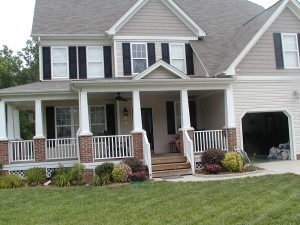Eastern North Carolina Important: COVID-19 Announcement.

A new construction home can be an exciting time when move-in day arrives. It’s clean and new and you are proud to call it your home. After a while a few cracks become noticeable; a stair-step crack that breaks a brick, block or solid concrete, horizontal cracks, wide cracks (the thickness of your fingernail or greater) or a pattern of cracks starting on one side of a corner and picking up on the other side.
Any new home can settle so minor cracks are to be expected. On the interior of your home, you may notice fine stress cracks in the walls, particularly above doorways. Sometimes small cracks will appear in the ceilings.
If you are concerned about these cracks, talk to your home builder. Your home should be warranted for the first year. Request that the warranty manager come out to evaluate your cracks. It is their job to bring in a foundation repair company to perform any foundation repairs necessary.
In most cases, the home builder has purchased a 10 year structural warranty to cover your new house. Find out who’s covering your home’s structural warranty and contact them with your concerns. Warranties stay with the house, not the homeowners.
One suggestion is to photo document what is going on with your foundation so that you can create a history of it over time. Inspect your house at least annually.
Settlement cracks tend to be the result of short-term settlement. It is uncommon and unlikely to have ongoing settlement of a house. Since it is very difficult to identify ongoing settlement from a one-time visit to the home, documentation of annual inspections can be to your benefit when submitting a structural warranty claim.
For more information about foundations repairs or to schedule an evaluation of your foundation cracks, contact Atlantic Foundation and Repair at 919-855-0855.